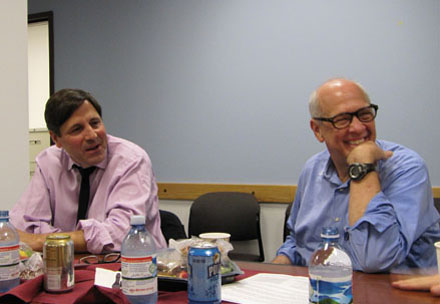
November 29, 2011 — The dynamics and landscape for campaigns in the 2012 presidential primary have shifted significantly since the last presidential election cycle in 2007–08, forcing candidates to rethink traditional strategies and uses of their resources, according to Russell J. Schriefer, senior adviser and media consultant to the Mitt Romney for President campaign.
A longtime Republican political consultant and founding partner of the Stevens & Schriefer Group, Schriefer told a Shorenstein Center audience that four factors are redefining this presidential campaign: the proliferation of pre-primary GOP debates; an even faster and more demanding social media space; the diminishing power of television advertising; and public perceptions of President Obama.
The Republican slate of candidates has already participated in nearly a dozen debates, with perhaps five more scheduled between now and voting night in the New Hampshire primary, Jan. 10. Schriefer said that the “debates have mattered much more this time than in any presidential primary I’ve been a part of.”
Because of the high stakes and the preparation necessary, this has meant that candidates are spending less time meeting with voters and doing fundraising, he said. Although the GOP Iowa caucus is just around the corner, on Jan. 3, no candidate is yet fully organized in all the state’s counties, partially the result of the heavy debate focus, which often cuts three days a week from the candidate’s time on the campaign trail, Schriefer said. When multiple debates happen in a seven-day period, he said, the “whole week is blown out.”
He noted that much of the fluid movement in GOP primary poll numbers for candidates has hinged on these events: “A lot of their rise and fall can be attributed to the debates.” Schriefer called Herman Cain “totally a creature of really good debate performances,” and attributed the reemergence of former House Speaker Newt Gingrich to the fact that he’s a “pretty good debater. He’s articulate, he’s strong.”
Moreover, the increased attention to communications in Twitter has changed the campaign’s dynamics relative to previous election cycles. Schriefer said he finds the popular microblog “an invaluable tool,” but also a “little scary” insofar as reaction time has to be exceptionally fast to respond to events successfully in the news cycle. Still, Schriefer said he appreciates being able to get perspectives from sources “left, right and center” in real time, and also to see what political reporters are thinking about.
This election cycle, television ads seem to move poll numbers less, Schriefer also observed: “That’s different. Normally, if you go up on the air, numbers move.” Part of this is that voters have many other places to get information, he noted. Indeed, television has become less about trying to move voters into your camp and more about “reassuring your own supporters, your own base” and helping with your “overall thematics,” he said. For former Massachusetts governor Romney, that means emphasizing “jobs and the economy.”
Schriefer speculated that these TV-related dynamics could end up diminishing the potential influence of third-party Super PACs, whose rise came about in the wake of the Supreme Court’s Citizens United decision, to the chagrin of campaign finance reformers. It could mean, he said, that the television ad space becomes so “cluttered” that the millions in ads are simply not that effective in this election cycle.
Finally, the campaign this time is unfolding differently because the “nature of candidate Obama,” said Schriefer, who suggested that the president is not as “cool” with some blocks of voters. “All of the energy was on the Democratic side four years ago.” Now, he said, voters — particularly independents — “clearly believe that the jury is out on Obama.”
By John Wihbey, Shorenstein Center.
Photos by Heather McKinnon, Shorenstein Center.

